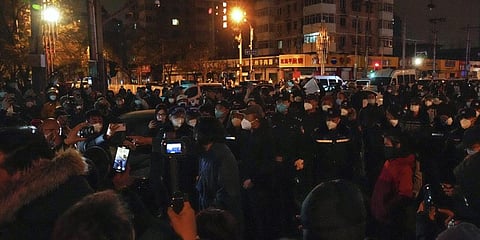

Protests erupted in various Chinese cities owing to Xi’s signature zero-Covid policy, called for the powerful leader recently re-appointed to an unprecedented third term to resign.
An unprecedented rebuke as authorities in at least eight cities struggled to suppress demonstrations Sunday that represents a rare direct challenge to the ruling Communist Party.
People took to the streets to call for an end to lockdowns and greater political freedoms, in a wave of nationwide protests not seen since pro-democracy rallies in 1989 were crushed.
The trigger
The current protests flared up after a fire broke out Thursday and killed at least 10 people in an apartment building in the city of Urumqi in the northwest, where some have been locked in their homes for four months. That prompted an outpouring of angry questions online about whether firefighters or people trying to escape were blocked by locked doors or other restrictions.
Large crowds gathered Sunday in the capital Beijing and Shanghai, where police clashed with protesters as they tried to stop groups from converging at Wulumuqi street, named after the Mandarin for Urumqi.
Crowds that had gathered overnight -- some of whom chanted "Xi Jinping, step down! CCP, step down!" -- were dispersed by Sunday morning.
Some called for an official apology for the deaths in the fire. One member of Xinjiang's Uyghur ethnic group, which has been the target of a security crackdown that includes mass detentions, shared his experiences of discrimination and police violence.
In the afternoon, hundreds rallied in the same area with blank sheets of paper and flowers to hold what appeared to be a silent protest, an eyewitness said.
In the capital, at least 400 people gathered on the banks of a river for several hours, with some shouting: "We are all Xinjiang people! Go Chinese people!"
AFP reporters at the scene described the crowd singing the national anthem and listening to speeches, while on the other side of the canal bank, a line of police cars waited.
An AFP journalist at the scene of the Shanghai protests Monday morning saw a substantial police presence, with blue fences in place along the pavements to stop further gatherings.
Social media scrubbed
The protests have been fuelled by social media which is heavily censored, the government has been striving to put a halt to the spread of content regarding the protests which may cause more civilians to join the streets in solidarity.
State censors appeared to have scrubbed Chinese social media of any news about the rallies, with the search terms "Liangma River", "Urumqi Road" -- sites of protests in Beijing and Shanghai -- scrubbed of any references to the rallies on the Twitter-like Weibo platform.
Videos including those showing university students singing in protest and rallies in other cities had also vanished from WeChat, replaced by notices saying the content was reported for "non-compliant or sensitive content."
The Weibo search for the hashtag #A4 -- a reference to the blank pieces of paper held up at rallies in a symbolic protest against censorship -- also appeared to have been manipulated, showing only a handful of posts from the past day.
China's strict control of information and continued travel curbs tied to the zero-Covid policy make verifying numbers of protestors across the vast country challenging.
But such widespread rallies are exceptionally rare, with authorities harshly clamping down on any and all opposition to the central government.
Protests also occurred on Sunday in Wuhan, the central city where Covid-19 first emerged, while there were reports of demonstrations in Guangzhou, Chengdu and Hong Kong.
State-run newspaper the People's Daily published a commentary Monday morning warning against "paralysis" and "battle-weariness" in the fight against Covid -- but stopped far short of calling for an end to hardline policy.
Investors were spooked by the weekend protests, with Asian stocks opening sharply lower on Monday morning.
China reported 40,052 domestic Covid-19 cases Monday, a record high but tiny compared to caseloads in the West at the height of the pandemic.
(With input from agencies)